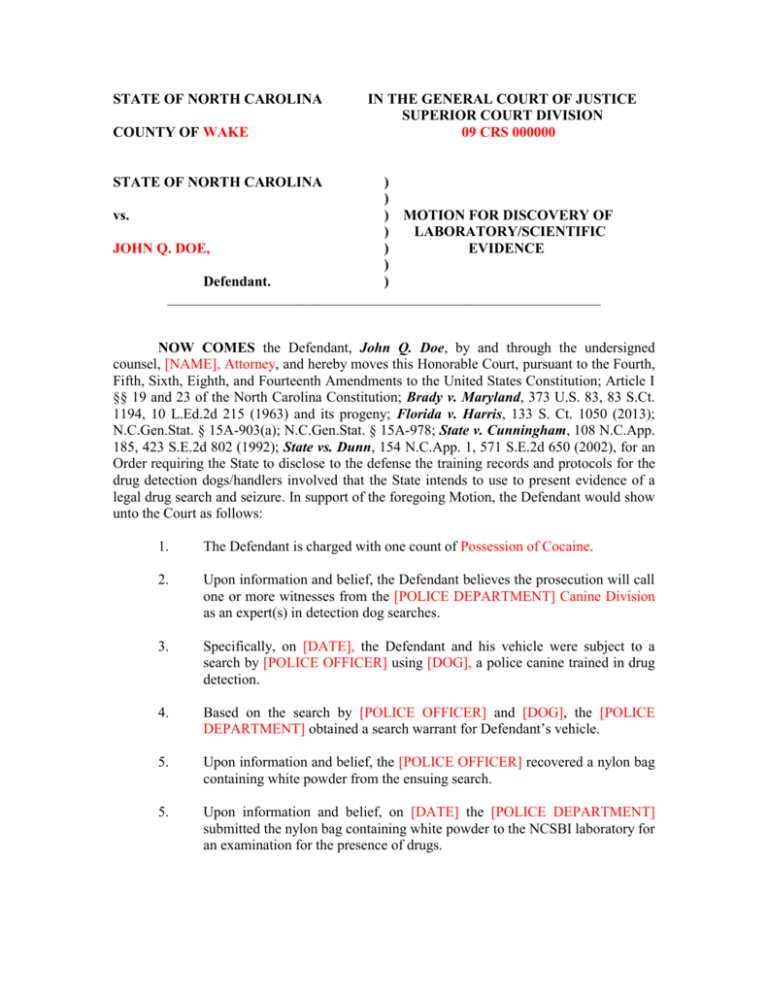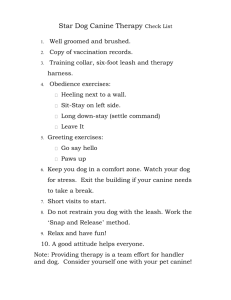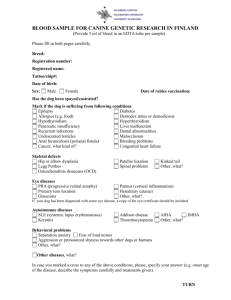Motion for Drug Dog Discovery - NC Office of Indigent Defense
advertisement

STATE OF NORTH CAROLINA COUNTY OF WAKE IN THE GENERAL COURT OF JUSTICE SUPERIOR COURT DIVISION 09 CRS 000000 STATE OF NORTH CAROLINA ) ) vs. ) MOTION FOR DISCOVERY OF ) LABORATORY/SCIENTIFIC JOHN Q. DOE, ) EVIDENCE ) Defendant. ) ____________________________________________________________ NOW COMES the Defendant, John Q. Doe, by and through the undersigned counsel, [NAME], Attorney, and hereby moves this Honorable Court, pursuant to the Fourth, Fifth, Sixth, Eighth, and Fourteenth Amendments to the United States Constitution; Article I §§ 19 and 23 of the North Carolina Constitution; Brady v. Maryland, 373 U.S. 83, 83 S.Ct. 1194, 10 L.Ed.2d 215 (1963) and its progeny; Florida v. Harris, 133 S. Ct. 1050 (2013); N.C.Gen.Stat. § 15A-903(a); N.C.Gen.Stat. § 15A-978; State v. Cunningham, 108 N.C.App. 185, 423 S.E.2d 802 (1992); State vs. Dunn, 154 N.C.App. 1, 571 S.E.2d 650 (2002), for an Order requiring the State to disclose to the defense the training records and protocols for the drug detection dogs/handlers involved that the State intends to use to present evidence of a legal drug search and seizure. In support of the foregoing Motion, the Defendant would show unto the Court as follows: 1. The Defendant is charged with one count of Possession of Cocaine. 2. Upon information and belief, the Defendant believes the prosecution will call one or more witnesses from the [POLICE DEPARTMENT] Canine Division as an expert(s) in detection dog searches. 3. Specifically, on [DATE], the Defendant and his vehicle were subject to a search by [POLICE OFFICER] using [DOG], a police canine trained in drug detection. 4. Based on the search by [POLICE OFFICER] and [DOG], the [POLICE DEPARTMENT] obtained a search warrant for Defendant’s vehicle. 5. Upon information and belief, the [POLICE OFFICER] recovered a nylon bag containing white powder from the ensuing search. 5. Upon information and belief, on [DATE] the [POLICE DEPARTMENT] submitted the nylon bag containing white powder to the NCSBI laboratory for an examination for the presence of drugs. 6. The prosecution has previously provided a laboratory report of the North Carolina State Crime Laboratory dated DATE in which AGENT concluded that the nylon bag contained .XX grams of cocaine. 7. Pursuant to the legal authorities cited in the preamble of this Motion, the Defendant hereby moves the Court to enter and Order commanding the prosecution to provide the following information within ten days prior to the trial of these matters: a. All documents relating to the canine searches conducted in the case, including but not limited to police reports, case reports, notes, photographs, and videos; b. All documents relating to the training and certification of the dog/handler team, including but not limited to current resumes, maintenance training records, veterinary records, results of proficiency assessments, testing and field logs, handler's logs, score sheets, list of items the dog(s) has been trained to alert on, the dog's method for alerting, and certification records; c. All documents relating to the work history of the dog(s) involved in the case, including any and all documents relating to false positives and false negatives, as well as handler strategy following such errors; d. Any and all documents describing how every test, trial, or evaluation of the dog(s) involved was conducted, and the dog’s performance on each and every test, trial, or evaluation; e. All documents relating to the results of canine searches conducted by the dog(s) involved in the case, including but not limited to deployment/utilization logs, confirmed case results, number of false alerts, and seizure logs; f. All standards, protocols, guidelines and training materials utilized by the canine search units involved in the investigation of the case; g. All documents establishing minimum performance standards for narcotic detection canine certification tests; h. All standards, procedures, and protocols for certification of canine detection dog teams; i. The names of any and all veterinarians used for the dog(s) involved in the case; j. All purchase information on the dog(s) involved in the case; k. All biographical records of the dog(s) involved in the case, including but not limited to those that would establish its date of birth, place of birth, breed, and pedigree. 8. The requested information/documentation is critical to ensuring that the Defendant’s rights to effective assistance of counsel, confrontation and crossexamination, and due process are provided. 9. At trial, the State may introduce expert opinion regarding the alleged search conducted by [POLICE OFFICER] and [DOG(S)] on [DATE]. As the State’s expert will have utilized training methods and alert signals pursuant to the Canine Unit’s training protocol, the Defendant would be prejudiced in the trial of these matters if the methods and procedures used by the officer to reach any conclusions were not disclosed to the defense. 10. In order to effectively prepare for cross-examination of the State’s expert, the Defendant must have access to the information outlined in paragraph 7(a – k) above. 11. If the Defendant is not given access to the information outlined in paragraphs 7(a – k) above, the lack of such access will result in a denial of the Defendant’s rights to effective assistance of counsel, confrontation and crossexamination, and due process of law. 12. In Florida v. Harris, 133 S. Ct. 1050 (2013), the Supreme Court held that the adequacy of a dog’s alert for the purposes of probable cause must be evaluated under the totality of the circumstances. If the state establishes a presumption of probable cause to search by demonstrating the dog’s satisfactory performance in a certification or training program, then the defendant must have the opportunity to challenge evidence of the dog’s reliability. Id. at 1057. Evidence that a defendant may present to challenge the dog’s reliability includes: the adequacy of the dog’s certification or training program, how the dog (or its handler) performed during training, the dog’s (or its handler’s) history in the field, and the circumstances surrounding the particular alert in the case, including whether the dog (or its handler) were working in unfamiliar conditions. Id. at 1057-8. The defendant can only present evidence on these issues enumerated in Florida v. Harris if requested information regarding the dog and handler’s training and performance is provided in discovery. 13. In State v. Cunningham, 108 N.C.App. 185, 423 S.E.2d 802 (1992), the Court of Appeals, in holding that defendants are entitled to “pretrial discovery of not only conclusory lab report, but also of any tests performed or procedures utilized…to reach such conclusion”, the Court also held the scope of discovery to encompass the materials necessary to enable a defendant to determine that “the tests performed were appropriate and to become familiar with the test procedures.” (citing 2 A.B.A. Standards for Criminal Justice, Commentary to Standard 11-2.1(a)(iv)2d.ed. 1980 & Supp. 1986). 14. In State v. Dunn, 154 N.C.App. 1, 571 S.E.2d 650 (2002), the defendant argued that the trial court erred “in failing to provide defendant discovery information pertaining to laboratory protocols, incidences of false positive results, quality control and quality assurance, and proficiency tests of the State Bureau of Investigation laboratory…” 15. In Dunn, the Court of Appeals said the defendant was entitled to such information and ordered a new trial. 16. As in the above cases, the training and use of drug detection dogs requires specialized skills, knowledge, and records that the Defendant would not otherwise have access to. The information in the training records and other materials listed in paragraph 7(a – k) are necessary in order for the Defendant to determine the appropriateness and reliability of the procedures used by the Canine Unit. 17. In order to ensure that the Defendant’s constitutional rights are afforded, the Court should order the State to disclose to the defense all of the information outlined in paragraphs 7(a – k) above. WHEREFORE, the Defendant respectfully prays unto this Court for the following relief: 1. That the Court enter an Order requiring the prosecution to provide the defense with the information outlined in paragraphs 7(a – k) above; and 2. For such other and further relief to which the Defendant may be entitled and which the Court may deem just and proper. This the ____ day of ________ 2012. By: ________________________________ Attorney









